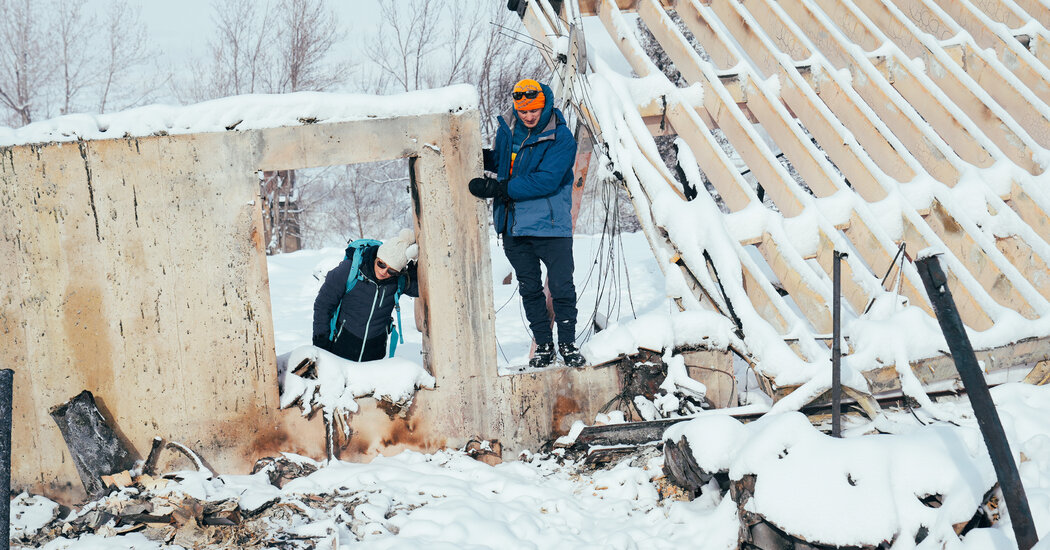After Catastrophic Fire, Colorado Fights a New Hazard: 10 Inches of Snow
A snowstorm brought relief to fire crews battling massive fires. But those whose homes survived were struggling against new threats — from cold and ice.LOUISVILLE, Colo. — Just two days after they fled a firestorm, residents of two Colorado suburbs gutted by flames slogged back home on Saturday through nearly a foot of snow and single-digit temperatures to confront a new list of woes: frozen pipes and water damage, thanks to an abrupt turn in the weather.The desperately needed snow arrived too late to save as many as 1,000 homes that were destroyed after a wildfire fueled by hurricane-force wind gusts roared through parched grasses and into suburban cul-de-sacs in the suburbs of Louisville and Superior, just outside the college town of Boulder.With thousands of surviving homes still without power and gas on Saturday, the 7-degree temperatures and 10 inches of snow that fell on the Boulder area touched off a frantic new battle against the weather. Residents hiked into their neighborhoods to drain their pipes and empty hot-water tanks. They scrambled to set up space heaters. People on vacation hundreds of miles away pleaded for help in shutting off the water and opening up their taps to prevent a flood.In a discouraging reversal, law-enforcement officials also raised the possibility on Saturday that there could be casualties from the fire. A day after officials said there had been no immediate reports of deaths, officials from the Boulder County sheriff’s office said they now believed that two people were still missing.“Snow will complicate what we can do today, but we’re doing everything we can to find those missing folks,” said Jennifer Churchill, a spokeswoman for Boulder County.Ms. Churchill declined to identify the missing or say where they had last been seen. But family members identified one of them as Nadine Turnbull, 91, telling 9News that a relative had tried to rescue Ms. Turnbull from her home in Superior only to be turned back by flames engulfing the front and back doors.Nearly 13,000 households around Boulder were without natural gas on Saturday and 7,500 households still had no power, according to Xcel Energy, the local utility provider. The company said that electricity would be restored later on Saturday but that natural gas would take several days.A flame flickered in the remains of a home destroyed by a pair of wildfires in Superior, Colo., on Saturday.David Zalubowski/Associated PressThe Town of Superior said it was shutting off water in the fire zone on Saturday to prevent additional damage.“This is disappointment on disappointment,” said Alli Bowdey, a nurse whose family fled their Louisville home and are now packed into a house with relatives. On top of everything else, her husband tested positive for the coronavirus and was quarantining in a hotel on Saturday.“We just looked at each other in disbelief,” she said.Robert Guokas, 83, was well-prepared for a power outage from his home in the Sans Souci mobile home park, which did not burn in the fires.A former Boy Scout, he has been keeping his mobile home warm with a propane heater, using a camping stove to heat water and bundling inside sleeping bags and layers of clothing collected over the years from Army surplus stores. But by Saturday, he was starting to run low on propane and he worried that if the outage continued for much longer, his preparations would not be sufficient.“That’s going to stretch my limit,” he said. He said that leaving for an emergency shelter would be even worse than staying home. By staying put, he could try to minimize the damage, for instance by replacing the pots he has set up to catch the water dripping through his roof after the harsh winds on Thursday tore part of it off.“You leave it for three or four days or a week, and it becomes a derelict, it becomes unfixable,” Mr. Guokas said.If the outage continues, he said, he worries most about his pipes bursting. The damage caused by a burst pipe could be so severe that it would be cheaper to find a new mobile home than to make repairs on his decades-old unit. But with his income of just $1,400 a month from Social Security, he has no idea how he would afford either.As the scale of the destruction came into clearer view on Saturday, thousands of displaced families across the Boulder area began to confront questions about whether they would rebuild and how they would find temporary housing in a place confronting a stark shortage of homes and an affordability crisis that has already priced many young families out of Louisville and Superior.Even as Ms. Bowdey’s husband, a property manager, fights off Covid-19 at a hotel, he has been inundated with 200 requests for housing from families who now have no place to go, she said. “It kind of hits you every so often that this is not just weeks and months — this is years.”Clint Folsom, the mayor of Superior, said finding long-term housing for so many families was the next emergency. While his home survived the fire, his 76-year-old mother’s home burned to the ground, as did two homes his sister-in-law owns.“We’ve got hundreds and hundreds of people who are going to need housing,” Mr. Folsom said. “That’s going to be the challenge.”

